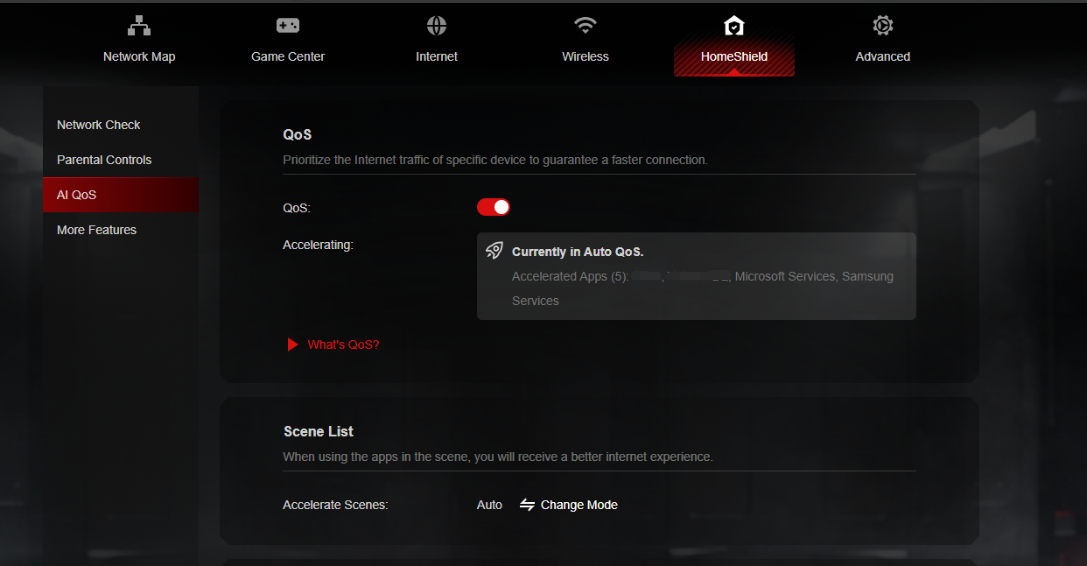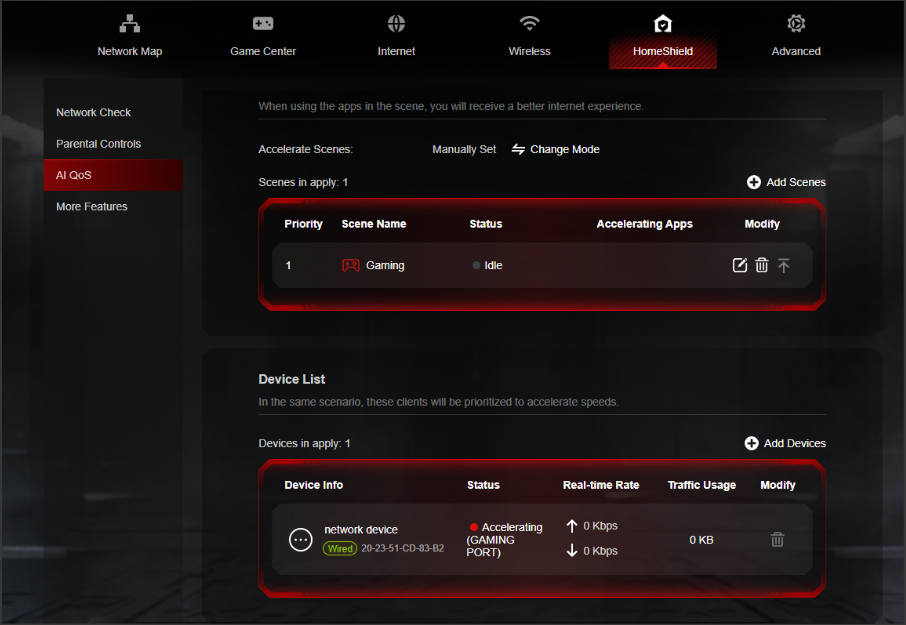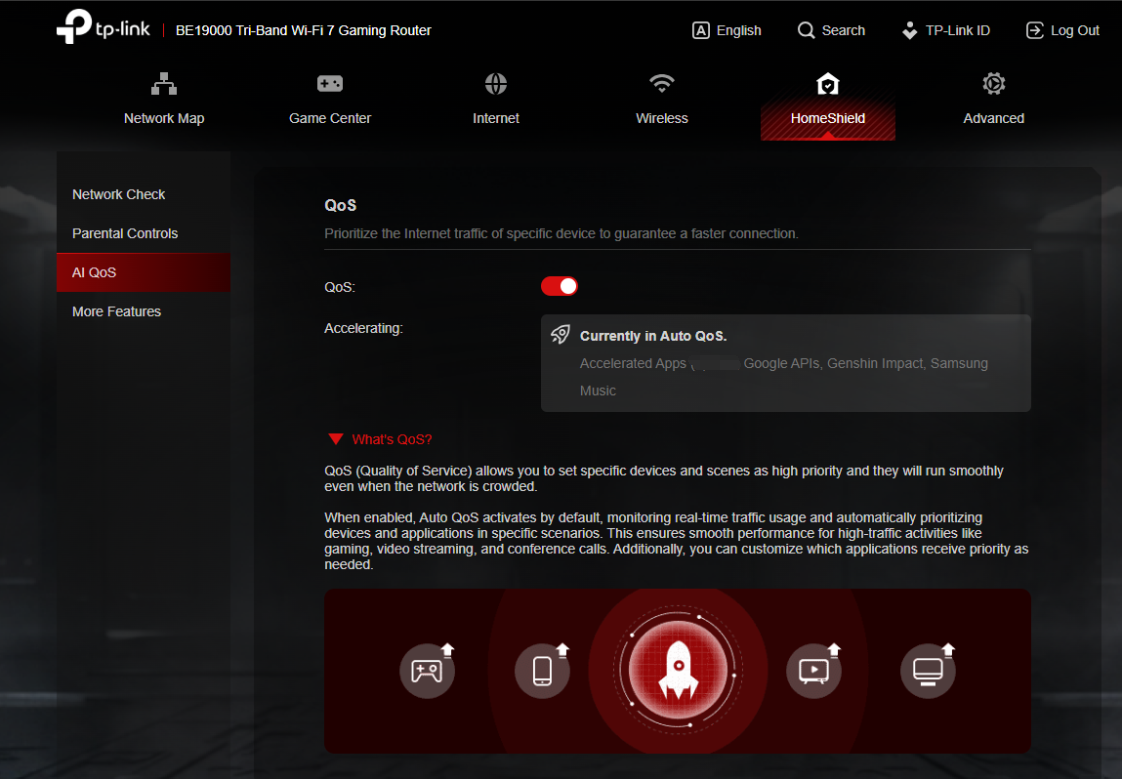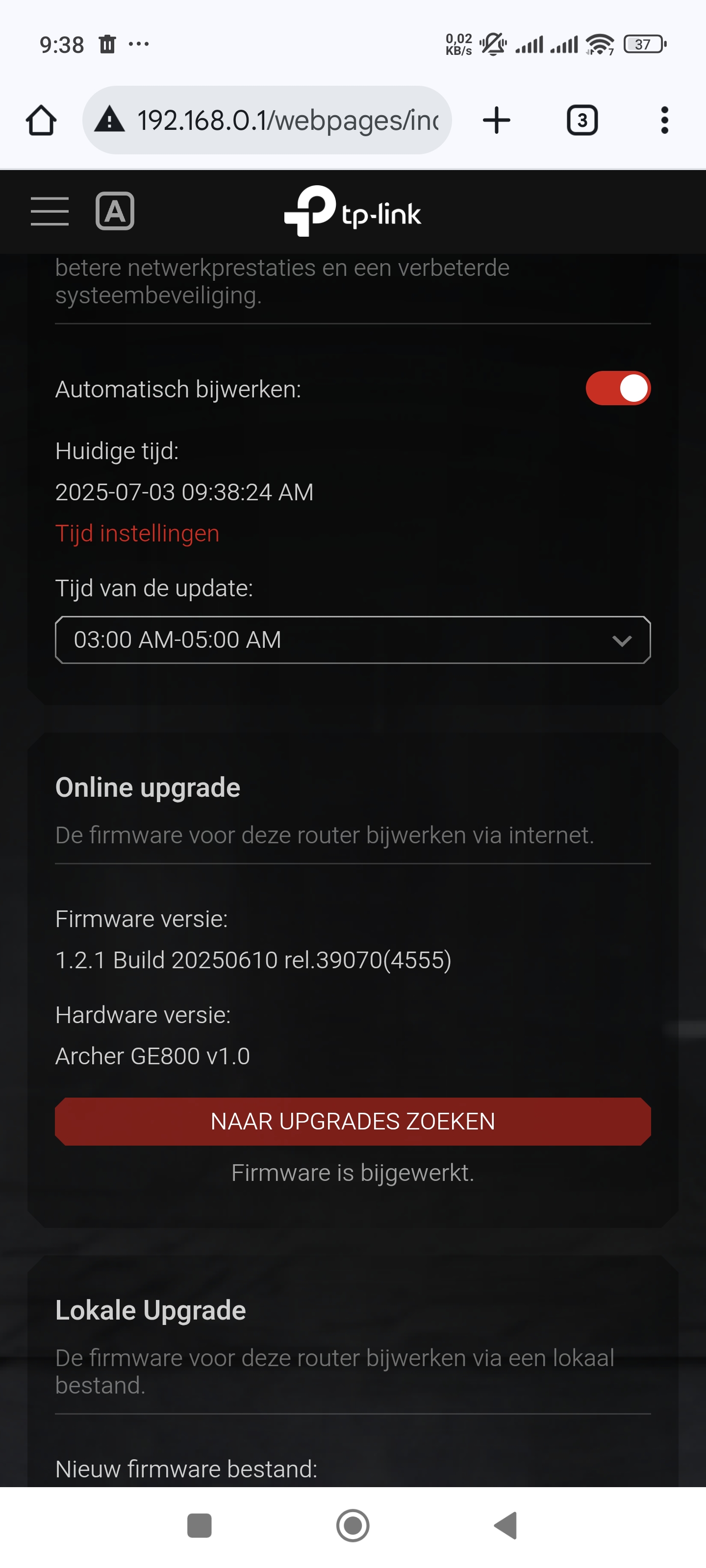Early Access Introducing AI QoS: Elevate Your Gaming Experience on the Archer GE800 Gaming Router!
Update on Jan 16th, 2026:
The official version of Archer GE800 V1, 1.3.2 Build 20250929, has been released publicly. Users can check for updates via the router's web interface or through the Tether App to install the latest version manually.
If you cannot find the latest version, please download the firmware from the official website and upgrade it manually:
Archer GE800_V1_1.3.2 Build 20250929
We will manually lock this post to better focus on discussions regarding the new firmware. We also encourage all users to upgrade to the latest firmware for testing and to provide feedback.
--------------------------------------------------------------------------------
Hello Everyone,
We are excited to announce a pre-release firmware update introducing AI QoS (Quality of Service) for the Archer GE800 V1 before its official release. This allows our users to enjoy the ultimate gaming experience in advance.
AI QoS is designed to revolutionize your online gaming experience. Leveraging artificial intelligence, our new feature set transforms how your router manages bandwidth, ensuring seamless performance for all your applications. Here are the key features that make AI QoS a game-changer.
One-Click Acceleration
Say goodbye to complicated setups! With just a single click, you can enjoy lightning-fast performance without the hassle of complex configurations. Get ready to dive into your favorite games instantly.

Dynamic Bandwidth Detection
Our advanced technology allows you to instantly assess your available bandwidth. By continuously monitoring network conditions, AI QoS helps prevent congestion, ensuring that your gaming and streaming sessions remain smooth and uninterrupted.
Enhanced QoS Optimization
Experience significantly reduced gaming latency, even in congested network scenarios. AI QoS intelligently optimizes your connection, minimizing lag and providing a competitive edge when it matters most.

Intelligent Traffic Prioritization
Every application deserves the best performance. With AI QoS, traffic is prioritized intelligently, guaranteeing that all your applications run optimally. Whether you're gaming, streaming, or video conferencing, you can be confident that your experience will be top-notch.

More New Features and Modifications:
This pre-release firmware includes all the new features and modifications mentioned in previous posts below:
Pre-release Firmware for Archer GE800/GE550/GE650v1 Supports EasyMesh in AP Mode, DoH&DoT, ECO Mode
Bug Fixes:
Fixed the issue where enabling Bandwidth Control for the Guest Network will take effect for all networks.
Firmware Download:
Before the Upgrade
(1) Please be sure you have read the Beta Test Agreement before upgrading the pre-release firmware!
(2) For the sake of insurance, it's always recommended to save a copy of the router's Backup Config file before upgrading or downgrading.
(3) This pre-release firmware for Archer GE800 V1 can be applied to all versions (EU/US/AU/CA/etc).
(4) You may follow the guide to upgrade the firmware of your router. How to Upgrade the Firmware on the TP-Link Wi-Fi Routers.
(5) The screenshots in this article are taken from the web GUI of Archer GE800 V1 for reference only.
(6) This version of software can be degraded to the previous official version.
Direct Firmware Download Link
| Archer GE800_V1 | Archer GE800(EU)_V1_1.3.2 Build 20251013 (Updated Pre-release firmware) |
Additional Information
As always, we value your feedback. If somehow you encounter an issue during or after the router firmware upgrade, please comment below with the following info. Your input helps us continue to improve and provide the best products and support.
- Provide a detailed network layout, including how the devices are connected, especially if there are EasyMesh satellite devices.
- Detailed issue description, and provide more information on the specific conditions that seem to trigger the problem.
Thank you for your continued support and for being part of our community.
Update Log
Oct 13th, 2025:
Updated to provide a new pre-release firmware based on the latest 1.3.1 official version.
Jul 4th, 2025:
Updated to provide a new pre-release firmware based on the latest 1.2.1 official version.
Jun 13th, 2025:
Release of the article.
Related Articles
Pre-release Firmware for Archer GE800/GE550/GE650v1 Supports EasyMesh in AP Mode, DoH&DoT, ECO Mode
- Copy Link
- Subscribe
- Bookmark
- Report Inappropriate Content
Are you downgrading to the official 1.1.6 Build 20241120 or the pre-release 1.1.6 Build 20250512 we provided in this thread?
I understand that you have been downgraded to version 1.1.6, but I hope you can try your best to recall the issue of disconnection that occurred when enabling AI QOS. Please help us gather more details so that our engineers can try to reproduce it as accurately as possible.
1. Did you enable the AI QoS and leave it on Auto Mode, then set the Gaming scene for all apps?
2. When the network dropped out for the entire household, did you notice the LED status on the GE800? I'm wondering whether the GE800 gets rebooted at that time, if all the devices are losing connectivity/internet. Will the connectivity restore on its own?
3. Are there any devices connecting to the MLO Network? If possible, I hope you can try turning off the MLO Network and observe the connectivity again.
If you're willing, I hope you can try the new beta firmware (shared via ticket TKID250650107), which may help improve the performance.
@Kevin_Z I downgraded to the 20250512 firmware.
1) Yes, what you describe is what I did.
2) No, I didn't notice LED behavior but then I have the LEDs turned off.
3) Yes, I had one device connected using the MLO SSID.
While the first instinct with the interruption is an Internet failure I suspect it is actually a kernel crash.
It's too late for me to do anything else now because I have swapped back to using the Netgear Orbi devices.
Oddly enough, because of the incomplete Mesh implementation (no progress in more than a year) I had to move all my IoT devices to the main network.
It was difficult but I did manage to do it.
So, on the Orbi, I can now use its IoT network, set to 5GHz only, to resolve the problem with the Nintendo switches not using the 5GHz WiFi which I can't do with the TP Link devices because of the limited Mesh implementation.
- Copy Link
- Report Inappropriate Content
Pro-gamer wrote
@Kevin_Z hi, I have tested 1.1.9 is not stable in terms of speed, the fluctuation ping and jetter is a bit high WiFi MLO does not drop out but speeds fluctuate, nothing wrong or noticed any errors, only WiFi speed test has become lower
Caption
@Pro-gamer Thanks for letting me know the results of the new beta firmware.
What's the expected speed you can get when connecting to the MLO or 6G network before upgrading to this 1.1.9 version?
Is the testing result on your Xiaomi 14 Ultra and it's connecting to the MLO Network? How about other devices?
Do you enable AI QoS on GE800 and add this phone to the High priority?
- Copy Link
- Report Inappropriate Content
raven-au wrote
Are you downgrading to the official 1.1.6 Build 20241120 or the pre-release 1.1.6 Build 20250512 we provided in this thread?
I understand that you have been downgraded to version 1.1.6, but I hope you can try your best to recall the issue of disconnection that occurred when enabling AI QOS. Please help us gather more details so that our engineers can try to reproduce it as accurately as possible.
1. Did you enable the AI QoS and leave it on Auto Mode, then set the Gaming scene for all apps?
2. When the network dropped out for the entire household, did you notice the LED status on the GE800? I'm wondering whether the GE800 gets rebooted at that time, if all the devices are losing connectivity/internet. Will the connectivity restore on its own?
3. Are there any devices connecting to the MLO Network? If possible, I hope you can try turning off the MLO Network and observe the connectivity again.
If you're willing, I hope you can try the new beta firmware (shared via ticket TKID250650107), which may help improve the performance.
@Kevin_Z I downgraded to the 20250512 firmware.
1) Yes, what you describe is what I did.
2) No, I didn't notice LED behavior but then I have the LEDs turned off.
3) Yes, I had one device connected using the MLO SSID.
While the first instinct with the interruption is an Internet failure I suspect it is actually a kernel crash.
It's too late for me to do anything else now because I have swapped back to using the Netgear Orbi devices.
Oddly enough, because of the incomplete Mesh implementation (no progress in more than a year) I had to move all my IoT devices to the main network.
It was difficult but I did manage to do it.
So, on the Orbi, I can now use its IoT network, set to 5GHz only, to resolve the problem with the Nintendo switches not using the 5GHz WiFi which I can't do with the TP Link devices because of the limited Mesh implementation.
@raven-au Thank you for providing all the valuable information.
Earlier you mentioned that you have 4 WiFi 7 kits. Could you please clarify if you are using them in different networks? Or are you using them at different times in the same network environment? Can both Netgear and ASUS display all client devices accurately in their client lists?
Are you a blogger or an engineer specializing in network devices testing? I'm just out of curiosity. If it's not convenient, that's fine.![]()
- Copy Link
- Report Inappropriate Content
@Kevin_Z Hi Kevin, on speedtest I tested MLO and normal 6G, both give low download and upload on my device, plus logo with 7, which means MLO ping and jetter is high, although Qus is active and without QOS I tried, results were the same. I think more beta version error. 1.1.6 is problem-free version only WiFi I get 2.5GB WiFi7 with 1.1.8 I get 2.9GB and that was difficult WiFi's disappeared and physical restart WiFi's came back1.1.9 version I can't get higher than 300 MB 1.1.8 is good for higher download and upload only WiFi's that drop out if you use MLO
- Copy Link
- Report Inappropriate Content
Pro-gamer wrote
@Kevin_Z Hi Kevin, on speedtest I tested MLO and normal 6G, both give low download and upload on my device, plus logo with 7, which means MLO ping and jetter is high, although Qus is active and without QOS I tried, results were the same. I think more beta version error. 1.1.6 is problem-free version only WiFi I get 2.5GB WiFi7 with 1.1.8 I get 2.9GB and that was difficult WiFi's disappeared and physical restart WiFi's came back1.1.9 version I can't get higher than 300 MB 1.1.8 is good for higher download and upload only WiFi's that drop out if you use MLO
Please reset the GE800 to factory defaults and reconfigure it from scratch. Simply configure it to connect to the internet, but don't modify any other settings, such as QoS or Parental Control. Then test the speed you can achieve and show me the speed test results. Thank you.
- Copy Link
- Report Inappropriate Content
@Kevin_Z would be better if it had speedtest build in. This way bo interference from slower hardware or anything else. I have 8gb fiber, but currently only 5gb lan usb cards, don't want desktop in living room so my notebook with usb 5gb lan is only one i tested directly on ge800, but getting around 3,5gb down and 4 upload. Already tested several cables but same everytime, guess it has to do with usb lan or my notebook. Still looking for a notebook but didn't see any with 10gb lan. That's why i asked if it's possible to have built in speedtest like other tp link models
- Copy Link
- Report Inappropriate Content
Hello @Kevin_Z,
I wanted to give the AI QoS some time to see how it effects my network. After trying out the AI QoS for about a week I noticed no difference in my network performance. This is most likely due my client list being less than 50 clients with most of them being cameras or IoTs.
One thing I noticed on my MLO besides my devices sticking to one band is that I am getting an intermittent hangs, happening maybe 3-4 times a day (This is not related to AI QoS and happens regardless of it being on or off). When I am visiting a webpages, sometimes it just hangs for a moment and I have to click refresh or disconnect and reconnect to the router for it to load.
Please let me know if this is something on your radar as I am seeing other people are posting issues regarding MLO performance.
- Copy Link
- Report Inappropriate Content
Innocentone wrote
Hello @Kevin_Z,
I wanted to give the AI QoS some time to see how it effects my network. After trying out the AI QoS for about a week I noticed no difference in my network performance. This is most likely due my client list being less than 50 clients with most of them being cameras or IoTs.
One thing I noticed on my MLO besides my devices sticking to one band is that I am getting an intermittent hangs, happening maybe 3-4 times a day (This is not related to AI QoS and happens regardless of it being on or off). When I am visiting a webpages, sometimes it just hangs for a moment and I have to click refresh or disconnect and reconnect to the router for it to load.
Please let me know if this is something on your radar as I am seeing other people are posting issues regarding MLO performance.
@Innocentone Sure. I have reported this MLO concern to the development team, and I will confirm if it has been addressed.
When there are intermittent hangs when connecting to the MLO Network, are other wireless connections working fine?
Do the intermittent hangs happen on all of your there WiFi 7 clients?
- Copy Link
- Report Inappropriate Content
@Kevin_Z Kevin, my router has automatically upgraded to another version 1.2.1 Build 20250610 rel.39070(4555) and I can no longer downgrade when I choose 1.19 and want to downgrade, it gives an error message
- Copy Link
- Report Inappropriate Content
Kevin_Z wrote
@raven-au Thank you for providing all the valuable information.
Earlier you mentioned that you have 4 WiFi 7 kits. Could you please clarify if you are using them in different networks? Or are you using them at different times in the same network environment? Can both Netgear and ASUS display all client devices accurately in their client lists?
Are you a blogger or an engineer specializing in network devices testing? I'm just out of curiosity. If it's not convenient, that's fine.
@Kevin_Z I purchased them over time and swap them out, one for another, as developments such as new firmware occur.
I can't really comment on the ASUS kit, they are easily the worst WiFi 7 I have, they are generally unstable, they suffer from packet loss mostly for 2.4GHz devices, and consequently communication is often slow or unresponsive.
I think the two best in terms of the device list are the RBE970 and the BE85, both fluctuate but always seem end up at around at least 90 - 100 devices in the list, and devices are responsive.
I'm neither a blogger or a network device tester (although many years ago I managed the install and setup a fibreoptic network at a mine-site, so I am a bit technical), I just like playing with routers.
At one time I was considering getting into wireless driver development and tried to contribute to OpenWrt but wasn't particularly successful and didn't find it enjoyable, also it didn't look like it would lead to wireless code exposure (the recent stuff is usually closed source) so I stopped and continued with file systems related stuff.
Ian
- Copy Link
- Report Inappropriate Content
Information
Helpful: 7
Views: 69309
Replies: 486

